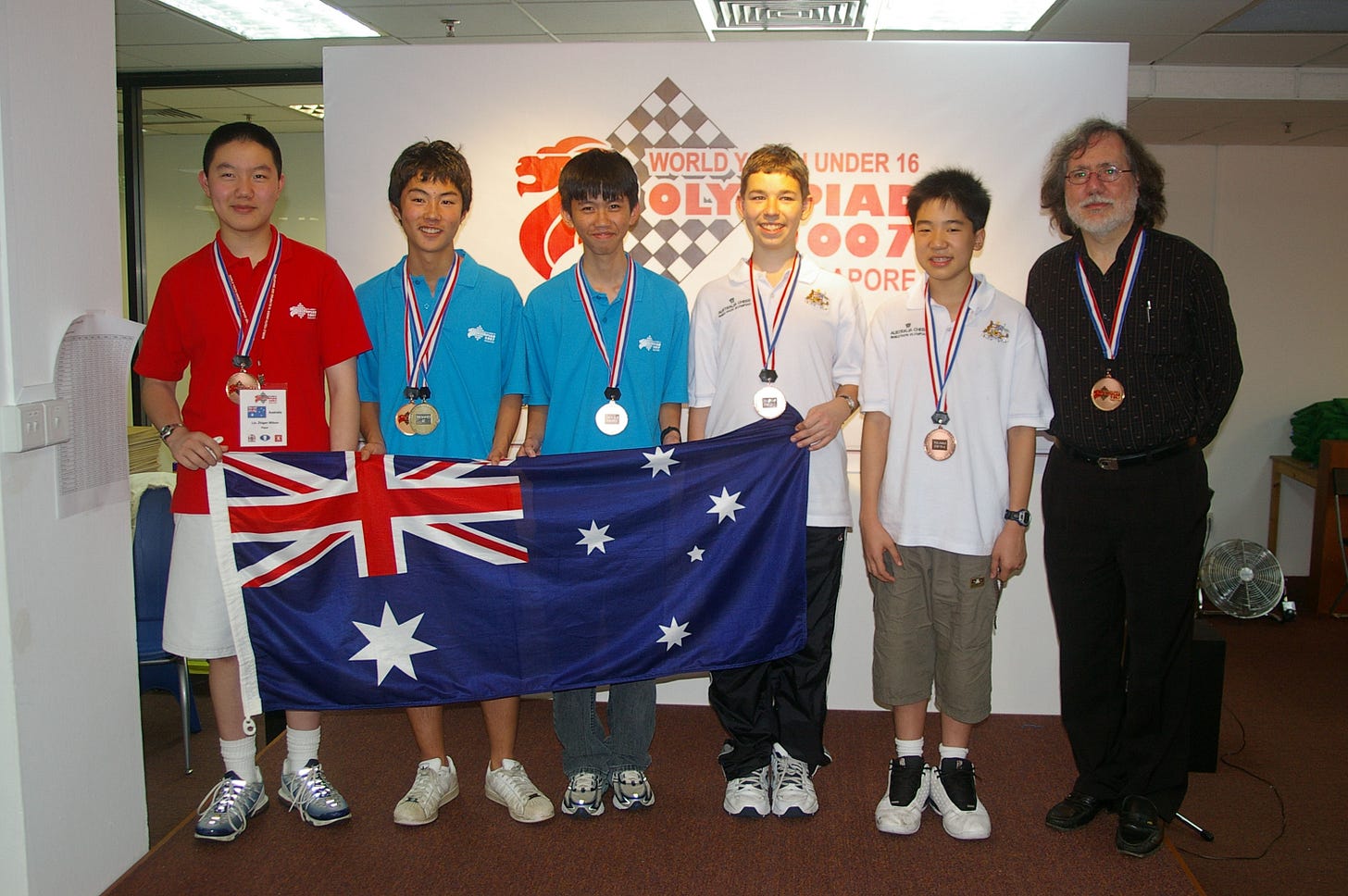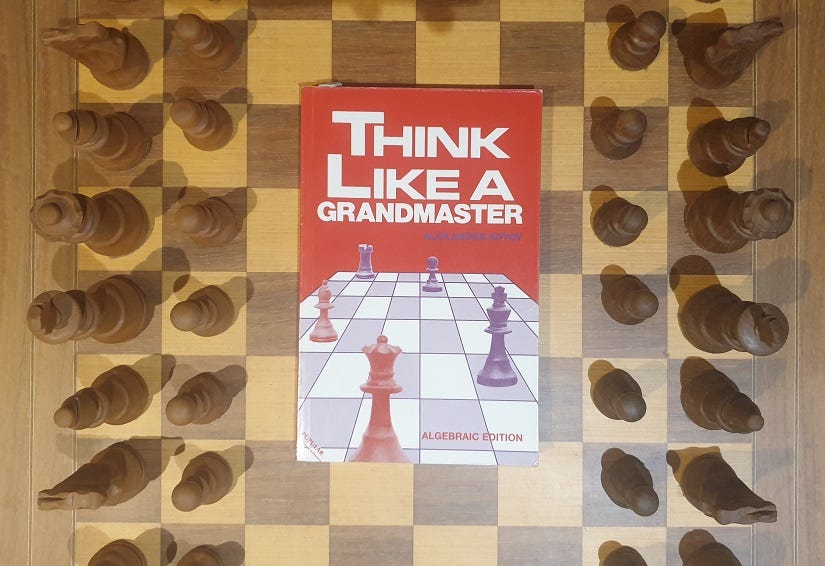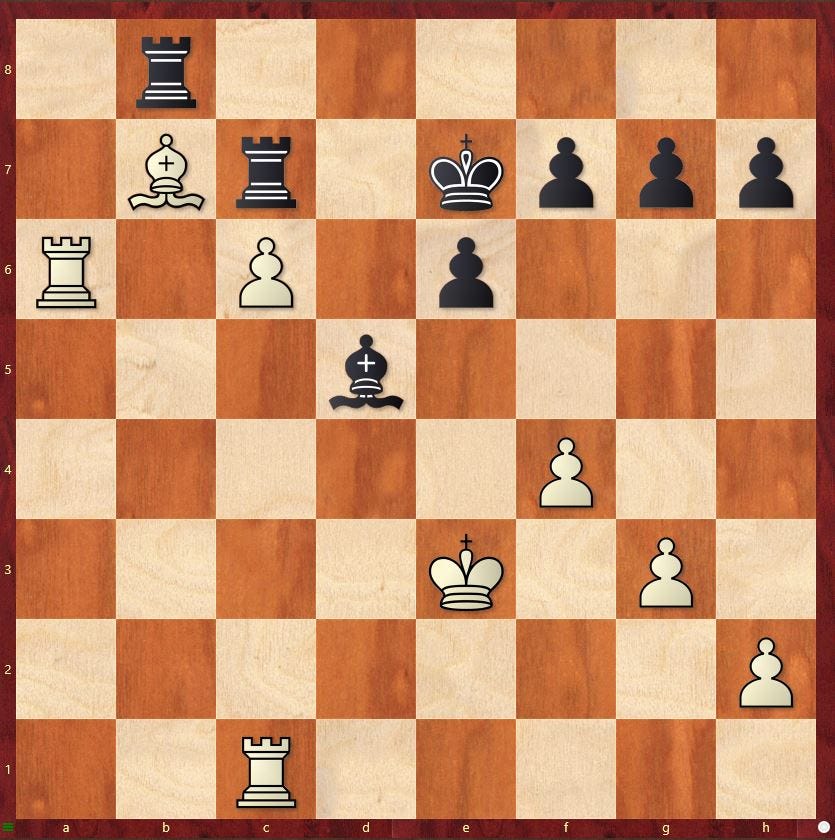How to think on your opponent's turn
I asked 3 grandmasters what they do
What should you do in your opponent’s thinking time?
I asked 3 grandmasters how they approach this important yet relatively unexplored topic.
Ian Rogers (Australia) [Wikipedia, X, Oops! I Resigned Again! (2021): Amazon, Forward Chess]
1. Do you have any tips on what to think about, or how to think, on the opponent’s time? What approaches worked well for you?
Moulthun: For myself, this is something I do often but it depends on the position. I will usually consider the best possible continuation (that way I won't be surprised if it's played) as well as some plausible ways both sides could go wrong. I don't know why I do the second one, it's just one of my chess habits.
Ian: I read about the Soviet method of thinking positionally on my opponent's time. Since I understood early that positional chess was a waste of time 🙂 (and in later years gave lectures on that topic), I was happy to walk around while my opponent was thinking and look at other games.
I also feel that when you return to the board you can often view the position with fresh eyes, and see new ideas when you return to the board.
Raymond: During my opponent's time, I am usually thinking more about long-term plans. Things such as:
Which is my worst-placed piece?
How should I improve it?
Where do my pieces belong?
How is my opponent likely to manoeuvre their pieces?
What are the potential pawn breaks for both sides and what are the resulting positions going to look like?
Thinking more strategically on my opponent's time helps me to conserve energy, as I'm not burning myself out calculating too many variations. Of course all this goes out the window if the position is razor sharp and the price of each move is very high. In such cases, long-term considerations often take a back seat and calculating concrete lines becomes a must. Of course, the depth of the calculation depends on the type of position. But for the vast majority of my games, going down different branches and seeing 3–5 moves ahead and then evaluating is sufficient.
2. In Think Like a Grandmaster (1971), Kotov quotes Botvinnik as saying “Basically I do divide my thinking into two parts. When my opponent’s clock is going I discuss general considerations in an internal dialogue with myself. When my own clock is going I analyse concrete variations.” What do you think about this approach?
Moulthun: I think this makes sense since you don't want to tire yourself out calculating lines you don't need to. Instead you can just jot down important ideas on their turn instead. If it's a very forcing continuation though you can perhaps consider more concrete lines.
Ian, Raymond: See answer 1.
3. While Botvinnik advocated for analysing hard both during the opponent’s move and your own, Smyslov said “A player must walk about between moves; it helps his thinking.” Do you tend to stay at the board, or walk around? Is it simply a matter of personal preference and what works best for each person, or do you think more players should stay at the board more/walk around more?
Moulthun: When things don't look critical and my opponent has many plausible options, I may only do a brief scan of tactics and playable ideas. Sometimes, I may just not be at the board altogether. However, if the position is more forceful or critical, you are more likely to find me at the board all the time.
Ian: It is very much a matter of preference, but I did notice that Anand's amazing speed as a 15 and 16-year-old was built on using his opponent's time to calculate his next move. (In other words the opposite of Botvinnik's advice—in particular since Botvinnik expected a player to think on their own time as well as their opponent's!)
Raymond: I think this really comes down to personal preference. I have heard that sitting at the board can be more psychologically unpleasant for the opponent, especially if you are higher rated. I can imagine that sitting opposite someone like Kasparov, staring down at me while my clock is running would be quite terrifying and would probably cause me to play worse than if he got up and left the board after every move. For me personally, I don't put as much emphasis on this effect on my opponent. I get up all the time, because it helps me to conserve energy. I don't usually think about my game while walking—it's not that I can't, but if I want to think about my game I'll do at the board. If I'm walking it's because I want a break and come back to the board a little bit more fresh later.
4. Do you have any interesting stories or experiences you'd like to share involving thoughts you had or things that happened during the opponent’s turn in a game?
Moulthun: Nothing of value but I used to sometimes have internal dialogues with myself during games. Sometimes I would try to guess my opponent’s moves for fun. Once I remember being very happy after my game. Not because I had won or played well but because I had predicted almost every move he had made.1 Knowing him before may have helped. Still, predicting his opening choice, variation, pawn moves and sacrifices made it enjoyable.
Ian: At the 2018 Batumi Olympiad, Giang Nguyen was threatened with sanctions by the arbiter when she returned from looking at games. She was told that since the Olympiad required players who wanted to use the toilet to tell the arbiter first, she could have been illegally going to the toilet and cheating!
At an Australian Reserves Championship in Sydney in 1975/6, one player took advantage of his opponent's absence to fill in extra moves on both scoresheets, sign them and submit them as a draw by repetition!
Walking around can have its own benefits. At the 1991 Tilburg tournament Kasparov was deep in thought while Kamsky was walking around. Kasparov's wife had just left (via the arbiter) a block of chocolate for Garry at the tea and coffee area, and when Kamsky arrived there he noticed a new treat and started eating the chocolate. Kasparov's wife looked on in distress but could do nothing while Garry's chocolate disappeared. (Incidentally this was the same year that Kamsky accused Kasparov of potentially poisoning his orange juice.)
5. Is there anything else you'd like to share with chessplayers on this topic?
Moulthun: I think everyone is different so you should find what works best for you. While you want to anticipate your opponents’ moves, you also don't want to tire yourself out or look through too many variations which may not end up happening either.
Ian: Beware. If you walk around you will not notice that you have forgotten to press your clock (or if you have a faulty clock and have pressed it without it starting). You also may not notice your opponent take back a move!
Alexander Moiseenko (2640)–Ehsan Ghaem Maghami (2552)
Isle of Man Open (5), 29.09.2004
The game has been headed for a draw since the opening, although Moiseenko quite reasonably declined Ghaem's two earlier offers. Here, however, with Ghaem walking around and looking at other contests, the game took a remarkable turn.
31.Rc3??
After making this move and pressing the clock, Moiseenko calmly unpressed the clock, moved the rook to c5 and pressed the clock again. Ghaem saw nothing but luckily for him a witness, Almira Skripchenko, had seen the whole incident (and been amazed by what she had seen and reported it to an arbiter). Using an original defence, Moiseenko claimed that he had written Rc5 on his scoresheet and that he should be allowed to play this move. Moiseenko's claim was, of course, denied and the game concluded quickly.
31…Rbxb7! 32.cxb7 Rxc3+ 33.Kd4 Bxb7 0-1

Are you happy with the way you think on your opponent’s turn? From the three grandmasters’ answers, I took away the following:
be aware of what you’re thinking on your opponent’s move
think about what’s best for your playing style and energy levels
unless you’re someone who can focus at the board for hours, getting up and walking around at least occasionally sounds healthy so you don’t get too tired. However, don’t do this out of sheer laziness. It’s a good skill to be able to hone in on what your opponent might be thinking, and what you can play in return. Personally, I think my chronic time trouble partially stems from not thinking very smartly during the opponent’s turn. When I consciously observed what I was actually thinking about on an average turn by the opponent, I realised I was often waffling about and not seriously calculating and preparing, as Anand above did.
A big thanks to the three GMs who were happy to answer my questions—do check out Moulthun’s channel, Ian’s latest book, Oops! I Resigned Again! which I loved (Amazon, Forward Chess), and Raymond’s Instagram.
I asked Moulthun if he was talking about me. He said he wasn’t, but he predicted I would ask him that. Damn it!







Interesting food for thought.
I've always been the type to walk around a lot. I think when I was younger, it was sort of out of laziness, but now I see other benefits to it as well.
Was also cracking up over the 1975/6 Aus Reserves story from Ian.
Loved the interview format and appreciate that you did some actual research for this one!
Curious what would some of the famous coaches say like Dvoretsky, Yusupov and Aagard...